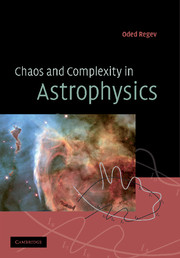Book contents
- Frontmatter
- Contents
- Preface
- Acknowledgements
- Part I Dynamical systems – general
- Part II Astrophysical applications
- 8 Introduction to Part II
- 9 Planetary, stellar and galactic dynamics
- 10 Irregularly variable astronomical point sources
- 11 Complex spatial patterns in astrophysics
- 12 Topics in astrophysical fluid dynamics
- References
- Index
12 - Topics in astrophysical fluid dynamics
Published online by Cambridge University Press: 14 January 2010
- Frontmatter
- Contents
- Preface
- Acknowledgements
- Part I Dynamical systems – general
- Part II Astrophysical applications
- 8 Introduction to Part II
- 9 Planetary, stellar and galactic dynamics
- 10 Irregularly variable astronomical point sources
- 11 Complex spatial patterns in astrophysics
- 12 Topics in astrophysical fluid dynamics
- References
- Index
Summary
Dond'escono quei vortici
Di foco pien d'orror?
Lorenzo da Ponte, Don Giovanni.Where the hell do all these vortices come from?
Ed Spiegel, Astrophysics Seminar.Developments in the theory of nonlinear conservative dynamical systems and Hamiltonian chaos have often been motivated, as we have seen, by problems in celestial mechanics. Fluid dynamics has, likewise, motivated much of the dissipative dynamical systems and pattern theory. However, while celestial mechanics is certainly a part of astronomy (a discussion of chaotic dynamics in planetary, stellar and galactic n-body systems can be found in Chapter 9 of this book), fluid dynamics can be regarded as an essentially separate discipline of the physical sciences and applied mathematics. Its uses and applications are widespread, ranging from practical engineering problems to abstract mathematical investigations, and its importance to astrophysics stems from the fact that most of the observable cosmos is made up of hot plasma, whose physical conditions are very often such that a fluid (or sometimes magneto-fluid) dynamical description is appropriate.
As is well known, and we shall shortly discuss explicitly, fluid dynamics has as its basis the description of matter as a continuum. Various assumptions then give rise to appropriate sets of the basic equations and these are usually nonlinear PDEs. The nonlinear PDEs of fluid (or magneto-fluid) dynamics are complicated dynamical systems and they have so far defied (except for the simplest cases) a rigorous and complete mathematical understanding.
Information
- Type
- Chapter
- Information
- Chaos and Complexity in Astrophysics , pp. 381 - 443Publisher: Cambridge University PressPrint publication year: 2006
